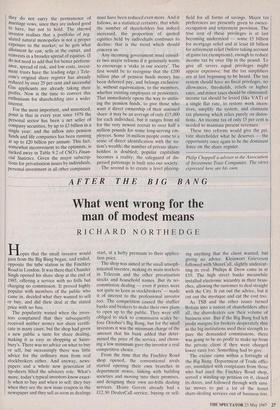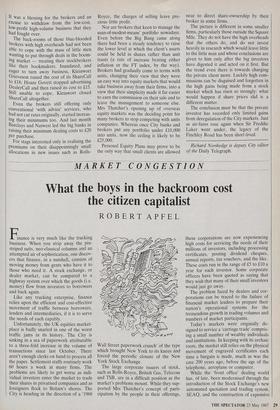AFTER THE BIG BANG
What went wrong for the man of modest means
RICHARD NORTHEDGE
apes that the small investor would gain from the Big Bang began, and ended, opposite the tube station in the Finchley Road in London. It was there that Chander Singh opened his share shop at the end of 1985, offering a service with no frills but charging no commission. It proved highly popular with members of the public who came in, decided what they wanted to sell or buy, and did their deal at the stated price with no fuss.
The popularity waned when the inves- tors complained that they subsequently received neither money nor share certifi- cate in many cases, but the shop had given a new public a taste for share dealing, making it as easy as shopping at Sains- bury's. There was no advice on what to buy or sell, but increasingly there was little advice for the ordinary man from real stockbrokers either. And anyway, news- papers and a whole new generation of tip-sheets filled the advisory role. What's more, today's typical investors know exact- ly when to buy and when to sell: they buy when they see the new issue coupon in the newspaper and they sell as soon as dealings start, at a hefty premium to their applica- tion price.
The shop was aimed at the small unsoph- isticated investor, making its main markets in Telecom and the other privatisation stocks and household names. But its no- commission dealing — even if prices were not quite so keen as stockbrokers' — made it of interest to the professional investor too. The competition caused the stuffier banks and brokers to make their own plans to open up to the public. They were still obliged to stick to commission scales be- fore October's Big Bang, but for the small investors it was the minimum charge of the amount that his hank added that deter- mined the price of the service, and choos- ing a low minimum gave the investor a real competitive choice.
From the time that the Finchley Road shop opened, the conventional rivals started opening their own branches in department stores, linking with building societies and moving into their premises, and designing their own no-frills dealing services. Hoare Govett already had a £12.50 DealerCall service, buying or sell-
ing anything that the client wanted, but giving no advice: Kleinwort Grieveson followed with ShareCall, slightly undercut- ting its rival. Phillips & Drew came in at £10. The high street banks meanwhile installed electronic wizardry in their bran- ches, allowing the customer to deal straight with the City. It cut out the advice, but it cut out the mystique and cut the cost too.
As TSB and the other issues turned Britain into a nation of shareholders after all, the sharedealers saw their volume of business soar. But if the Big Bang had left profit margins for brokers desperately thin as the big institutions used their strength to pare the demanded commissions, there was going to be no profit to make up from the private client if they were . charged lower rates too. Something had to give.
The excuse came within a fortnight of the Big Bang. Department of Trade offic- ers, inundated with complaints from those who had used the Finchley Road shop, served a winding-up petition on it, closed its doors, and followed through with simi- lar moves to put a lot of the lesser share-dealing services out of business too. It was a blessing for the brokers and an excuse to withdraw from the low-cost, low-profit high-volume business that they had fought over. The back-rooms of those blue-blooded brokers with high overheads had not been able to cope with the mass of little men wanting to put through deals in the boom- ing market — treating their stockbrokers like their bookmakers. Inundated, and eager to turn away business, Kleinwort Grieveson raised the cost of its ShareCall to £18; Hoare Govett stopped advertising DealerCall and then raised its cost to £15. Still unable to cope, Kleinwort closed ShareCall altogether. Even the brokers still offering only conventional 'with advice' services, who had not cut rates originally, started increas- ing their minimums too. And last month Barclays and Natwest led the big banks in raising their minimum dealing costs to £20 per purchase.
For stags interested only in realising the premiums on their disappointingly small allocations in new issues such as Rolls- Royce, the charges of selling leave pre- cious little profit.
Nor are brokers that keen to manage the man-of-modest-means' portfolio nowadays. Even before the Big Bang came along there had been a steady tendency to raise the lower level at which the client's assets could be held in shares rather than unit trusts (a rate of increase beating either inflation or the FT index, by the way). Brokers had gradually come to terms with units, changing their view that they were an easy way into equity markets that would take business away from their firms, into a view that their simplicity made it far easier to earn the commission on their sale and to leave the management to someone else. Mrs Thatcher's opening up of overseas equity markets was the deciding point for many brokers to stop competing with units companies. Whereas once City banks and brokers put any portfolio under £10,000 into units, now the ceiling is likely to be £25,000.
Personal Equity Plans may prove to be the only way that small clients are allowed near to direct share-ownership by their broker in some firms.
The picture is different in some smaller firms, particularly those outside the Square Mile. They do not have the high overheads that the others do, and do not invest heavily in research which would leave little to the little man and whose conclusions are given to him only after the big investors have digested it and acted on it first. But the trend even there is towards charging the private client more. Luckily high com- missions can be disguised and forgotten in the high gains being made from a stock market which has risen so strongly: what would happen if share prices slid is a different matter.
The conclusion must be that the private investor has recorded only limited gains from deregulation of the City markets. Just as air-fares rose again when Sir Freddie Laker went under, the legacy of the Finchley Road has been short-lived.
Richard Northedge is deputy City editor of the Daily Telegraph.










































































 Previous page
Previous page